Should I Register My Dog with a Kennel Club?
If you've recently brought a new dog into your home, you may be wondering what all the fuss is about registration. First, you need to understand that you can register your dog only if he or she is a purebred, or the offspring of two dogs of the same breed, who have been previously registered. The purpose of registration is to create a pedigree, hopefully assuring that each subsequent breed pair will enhance the breed, producing puppies who are as close as possible to the breed standard, or ideal specimen.
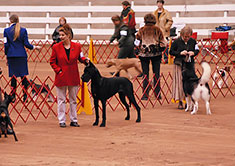
What dog registration clubs are there?
In the United States, the biggest registry is the American Kennel Club or AKC. The Canadian Kennel Club serves Canada, while the United Kennel Club registers dogs in all fifty American states and 25 other countries.
If you plan on breeding your dog, you will need registration papers in order to sell your puppies as purebreds. You can expect to receive top dollar for your puppies only if both parents of a litter are fully registered. However, if you plan on your dog only being a companion, rather than a breeding resource, you may be happy to have only a limited registration, which is cheaper to purchase.
A limited registration shows that your dog is a purebred, but it does not allow you to register any offspring as purebred. Aside from bragging rights, a limited registration allows you to enter your dog in kennel club events such as field trials, agility competitions, and obedience events. Under AKC rules, dogs with limited registrations are not permitted to compete in conformance AKC dog shows.
Each registry has its own benefits associated with registering, such as handbooks on puppy care, eligibility for events, free or reduced cost veterinary care, and a certificate suitable for framing. You should know that your registration fee also goes to support the registry and its goals.
Depending on which registry you choose, you may or may not agree with the goals of the organization. Your registration money will be used to support the registry's political goals, as well as to fund research and public education efforts. It's a good idea to check with the registry before you send in your money so you know exactly what you are supporting.
How do I register my puppy?
When you buy your puppy from a reputable breeder, the breeder will give you a dog registration application, showing your dog's pedigree which will prove his or her eligibility. You simply fill out the buyer's portion of the application and submit it to the registry with the required fee.
If your seller promises to provide papers "later", make sure you get enough details on the bill of sale to properly identify your puppy and to support the seller's claim that the puppy is eligible for registration.
According to the AKC, your bill of sale must include the following information:
- Breed of dog
- Date of birth
- Sex of the dog
- Color and markings
- Registered name and number of both of the dog's parents
- The AKC litter number, which your seller should have obtained by registering the litter
- Name of the breeder
- Date of sale or delivery
- Signature of the seller
If you are buying a dog and the seller cannot or will not provide all of the above information, you are likely not getting a dog that is eligible to be registered. If registration is important to you, don't buy from a breeder who doesn't provide all of the information.
Under AKC rules, registration of each puppy must be completed within twelve months of the date when the litter is registered by the breeder in order to avoid late registration penalty fees.
What is not included in dog registration?
Registration speaks only to the pedigree or ancestry of your puppy. It says nothing about a particular breeder's business practices or breeding practices. An AKC registration is no guarantee that you are not dealing with a puppy mill or with a disreputable person. You should still interview breeders carefully, check with several different breeders, get recommendations from people you trust, and make sure you personally see the conditions under which the puppies are kept before you put a deposit down on a dog.
Each breed has a standard that spells out such details as size, proportions, color of fur, eyes and nose, tail length, type of fur, and temperament. Serious breeders take into consideration the genetic traits of each of their dogs when matching dogs for breeding, with the idea that each pairing will produce only puppies who meet or come as close as possible to the breed standard.
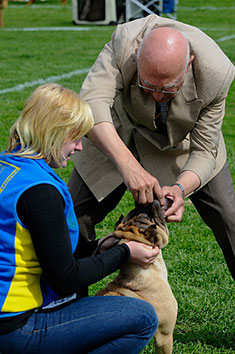
However, not all puppies born to purebred parents will be show dogs. Even though they can be registered as purebreds, they may not have inherited the correct genes to win any shows. These dogs can generally be purchased at a lower cost and often make fine companion dogs or even competitors in events other than conformance shows.
Simply being eligible for registration doesn't mean that your dog should be used for breeding because if the correct genes aren't there, you will not be able to produce show-quality puppies from your dog, either. If you are planning to become a breeder, make sure you buy only dogs that are of show-quality, even if you don't plan to show your dogs.
What do I use my registration for?
If you plan on having your dog compete in any registry-sponsored events, you will need to provide proof of registration, i.e. the dog's registration number from the certificate you received soon after you filed your application. A kennel club is interested in producing dogs who perform and look like the ideal specimen of each individual breed. Therefore, only those dogs who are certified as being a pure specimen of each breed are allowed to compete in their events. This assures that the dogs who appear in the competitions are good representatives of the breed.
If you plan on breeding your dog, his or her registration papers form the basis on which you will be able to register the litters produced. The owners of any possible mates will want to see registration papers to assure that your dog's offspring will meet the breed standard and can bring top price because they will themselves be eligible for registration.
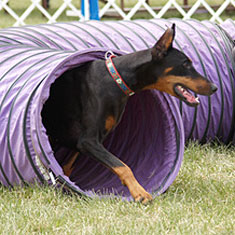
What happens if I don't register my puppy?
There is no problem with not registering your puppy, especially if you don't plan on breeding him or her. If you are simply looking for a companion animal and you happen to like a particular breed, there's no harm in having an un-registered purebred. If you subsequently change your mind, you can register your dog with full registration by paying a late fee.
If you have lost the application provided by your breeder, or if the breeder failed to give you an application, you can apply to the AKC for inclusion in the Purebred Alternative Listing, which gives people who have purebreds without papers the opportunity to compete in events sponsored by the registry. Although dogs registered in the alternative listing are not eligible for conformance events, they can compete in many of the performance events such as Earthdog, Lure Coursing, and Herding Trials.
Doggies Den: Latest Articles
 Homemade Thanksgiving Treats for Your Dog
Homemade Thanksgiving Treats for Your Dog
NUTRITION We all want to include our dogs in our holiday celebrations, but hopefully, you're aware that sharing table scraps with your dog isn't always the best idea.
 Keeping Your Dog Safe during the Summer Months
Keeping Your Dog Safe during the Summer Months
HEALTH Summer is coming on fast, so it’s time to plan how you will keep your dog safe and healthy through the lazy, carefree, warm days.
 Vaccination Time Again-Keeping Your Puppy Healthy
Vaccination Time Again-Keeping Your Puppy Healthy
DOG HEALTH So you have your new puppy picked out. There are quite a few shots, treatments and examinations that will keep the newest member of your family healthy.
 Canine Thanksgiving Feast
Canine Thanksgiving Feast
NUTRITION With the wide variety of food at Thanksgiving dinner, chances are you'll want to give your dog something special, too. If you're contemplating what to feed your dog for the holiday, here is a guide to a great Canine Thanksgiving Feast.
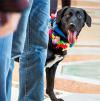 Dog Walking Tips Every Owner Should Know
Dog Walking Tips Every Owner Should Know
DOG FUN Walking your dog is not only crucial to keeping him healthy and happy, it strengthens the bond between your canine friend and his caregiver. There are a lot of obstacles out there. Don’t forget these simple tips to keep your walk fun and safe in the outside world.
 The Benefits of Physiotherapy for your Dog
The Benefits of Physiotherapy for your Dog
HEALTH The same techniques that physiotherapists use to treat a variety of injuries and conditions in humans have been adapted to suit animals with great success. Family pets, show dogs, and working dogs can all benefit greatly from physiotherapy. Dogs whose activities involve a lot of agility are especially susceptible to the types of problems that physiotherapy can address.
 The Decision- Adding a Dog to Your Family
The Decision- Adding a Dog to Your Family
FIRST TIME OWNERSBringing a dog into your family is a decision where many people don’t realize it’s magnitude until after they have the dog. There are a number of things that you need to research before you decide to purchase a dog, and it starts right in your own home.
 Bringing Your Dog Into Your New Baby's Life
Bringing Your Dog Into Your New Baby's Life
HEALTH Many believe that a dog and a new baby cannot happily coexist, so therefore the dog has to go. This is not necessarily the case.  A new baby does not mean you have to abandon your dog.

Doggies Den:
Most Popular Articles

Dog Pregnancy Symptoms
HEALTHIf you suspect your dog might be pregnant, check out part one in this series on pregnant dogs, where we cover pregnant dog symptoms.
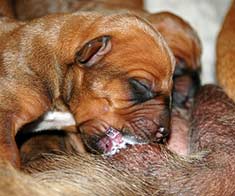
Dog Birth
HEALTHIn the third article of our dog pregnancy series, we look at the wonderful, but messy, process of bringing newborn puppies into the world.
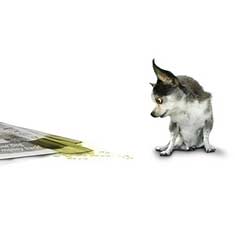
Indoor Dog Potties
DOG PRODUCTSIt's been a long day at work. You were so busy, you didn't even take time to eat a sandwich, let alone run home to let your dog out. You're on your way home, knowing the poor dog is crossing his or her legs by now, when your car breaks down, delaying you even further. Can't somebody make this easier?
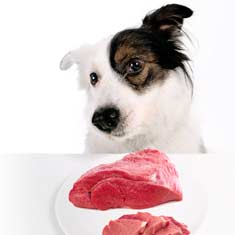
Your Dog’s Digestive System
PHYSIOLOGYEver wonder why your dog eats so fast? Or why he eats gross things? Or why he gets sick to his stomach? Or why his waste stinks so bad? Some of these things are normal, some are not.

Canine Respiratory System
BREATHINGThe basic function of your dog's respiratory system is to bring oxygen in to and remove carbon dioxide from the body. Knowing the symptoms of respiratory diseases can help you help your stay healthy.
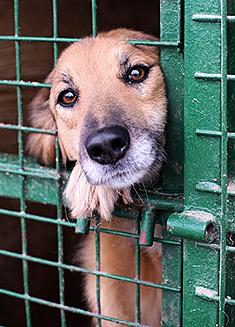
Shelter Dog Adoption Tips for Success
ADOPTION Are you intimidated by the prospect of "rescuing" a dog from a shelter? One reason that you may be wary of adopting a dog from a shelter is not knowing how to choose. Adopting a dog from a shelter can be a rewarding process, if you're prepared to do a reasonable amount of research.
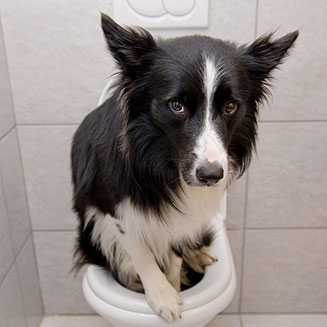
Canine Urinary Tract Infections
SYMPTOMS AND TREATMENTDoes your dog seem to be having trouble relieving his or her bladder? Learn how to recognize the signs of urinary tract infections and how to treat them before they spread.
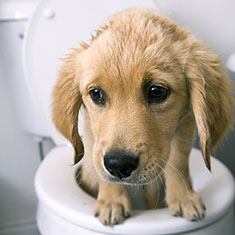
What to do for Dog Diarrhea
SYMPTOMS AND REMEDIESIf you have dogs in your house for any length of time, you have likely experienced at least one bout of dog diarrhea. Beyond the pain in the tuckus involved in cleaning up the mess, you should know what causes diarrhea, and when it's important to see the vet.

What to do for a Dog Bite
DOG BEHAVIOR Getting bitten by a dog can be scary, and you may be tempted to run around in circles for a while, trying to figure out what to do. Here's our guide to help you manage the situation.
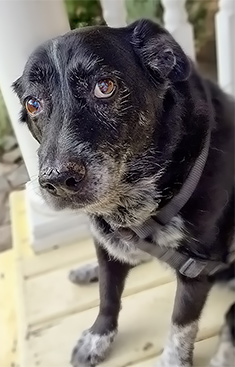
Top Ten Tips for Living with a Senior Dog
DOG HEALTH Bringing home a new puppy is so exciting, but it doesn’t take all that long for your exuberant puppy to grow into a senior dog who may have special needs. Here are the doggies.com top ten tips for taking care of your companion who has been with you through so much.
